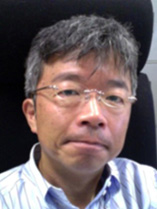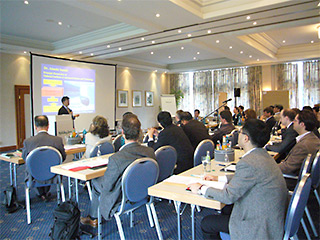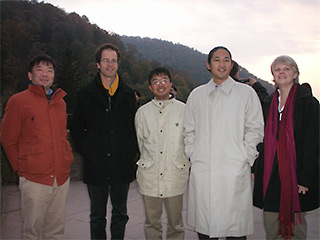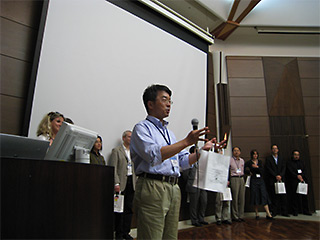お問い合わせ先
Research Cooperation Division I,
International Program Department,
Japan Society for the Promotion of Science (JSPS)
5-3-1 Kojimachi, Chiyoda-ku, Tokyo 102-0083, JAPAN
TEL
+81-3-3263-1944
TEL
fos*jsps.go.jp
Note: Please replace*with @.

 |
Takeshi Kakegawa Past Participations in FoS: |
|---|
I was invited to attend the first Japanese-German Frontiers of Science (JGFoS) Symposium held in Germany in 2004 as a speaker in the Earth Science session. At JGFoS symposiums the program, including the order of sessions, is not made known in advance. When everyone arrived at the venue, the program is announced. I was surprised to find that Earth Science was slated as the first session. So as it happened, I was the very first speaker to kick off what would be an annual series of JGFoS symposiums.
For it, the PGMs and JSPS staff gave me the daunting task of talking about the content of my cutting-edge research without using jargon and in ways that make it easy for researchers in other fields to understand. After finishing my talk, I didn’t have time to bask in its aftermath when the discussion period started. In it, I received a volley of unanticipated questions from researchers of different scientific disciplines. Even during the coffee break, researchers whom I’d never met came up to me and asked questions. I found that giving a presentation to and answering questions from researchers in divergent fields to be a very creative and even fascinating experience. After that, I was given more opportunities to participate in JGFoS symposiums as a PGM and a co-chair. Each time, I was delighted beyond words to be exposed to research being advanced on the very frontier of various fields. Above that, I was very pleased to learn how researchers of my generation had forged ahead with their work and become international superstars in their respective fields. To me, this discovery was both refreshing and stimulating.
An important task of the PGMs is to choose session topics and speakers. This has to be done with considerable thought and great care, as FoS participants would be turned off if the PGMs were to select topics and lecturers typical of those in their academic conferences. PGMs must choose cutting-edge topics that are stimulating to the participants and select a lineup of speakers who can energize the discussions.
While I was doing this work, a JSPS inspector general at that time came to me and said, “Grow through the FoS program.” Back then, I asked myself what he meant by “grow.” Now, I perfectly understand what he was saying. Though my specialty is earth science, I am conducting joint research with colleagues in the biology and chemistry fields. My impetus for doing this stems from the interest and newness I found in interdisciplinary research through the FoS program. It would be no exaggeration to say that both I personally and my research have “grown” as a result of my participation in this program.
Now, I see the seeds of FoS’s interdisciplinary exchange sprouting up here and there. The Graduate School of Science at Tohoku University holds a joint research meeting at the end of each fiscal year for graduate students in physics, chemistry and earth science. I was appointed as the first chair of its steering committee when the meeting was launched a few years ago. My idea was to create a Tohoku University version of a FoS symposium, so I designed a lecture style around that concept. The meeting continues to be held every year since then. This is one of the FoS seeds that has budded and bloomed at Tohoku University.
The 8th JGFoS symposium, held in October 2011, remains indelibly etched in my memory. I participated in that symposium as a member of JSPS’s FoS advisory board. It was held in Tokyo seven months after the Great East Japan Earthquake. Living in Sendai on 11 March 2011, I suffered the impact of the earthquake. In its immediate wake, I received many messages of concern and condolence from my German JGFoS colleagues. Amidst frequent aftershocks and unpredictable ramifications of the Fukushima nuclear reactor accident, I wondered what would happen with the JGFoS symposium slated to be held in Tokyo. Amazingly, all the scheduled German participants came except for only one person who was ill at the time. I remain deeply grateful to those German researchers who through the JGFoS program expressed their concern and generously gave their support to us in Japan. This I believe is an example of how the program can go beyond science in providing a nexus for cultivating enduring friendships between the Japanese and German people.
The 10th JGFoS symposium was held in Kyoto in the fall of 2013. I became a bit sentimental thinking back over the 10 years that had passed since the JGFoS program was launched. It’s my sense that the JGFoS program has reached maturity owing to the relentless efforts of successive generations of PGMs. Over the next 10 years, I believe that the JGFoS program may become emblematic of scientific exchange advanced between Japan and Germany.
FoS symposiums are is a sense extravagant meetings that can only be held in mature and economically advanced societies. “Salon” type meetings, which facilitate cross-disciplinary discussion, are common in European universities. In Japan, however, no such periodic meetings are held among top-level researchers from various disciplines. Consequently, FoS symposiums offer us valuable platform for advancing such interaction in Japan.
Though it is not possible to quantify the achievements of the FoS program, a look back over the history of science shows that researcher exchanges like FoS symposiums stimulate and vitalize individual researchers who give birth to new academic disciplines. JSPS’s FoS program offers a uniquely Japanese style of “salon” meetings and a platform for creating Japan-originated genres of science.
 3rd JGFoS Left: Giving session introduction |
 Right: Cultural tour in Heidelberg |
 【4th JGFoS】 |